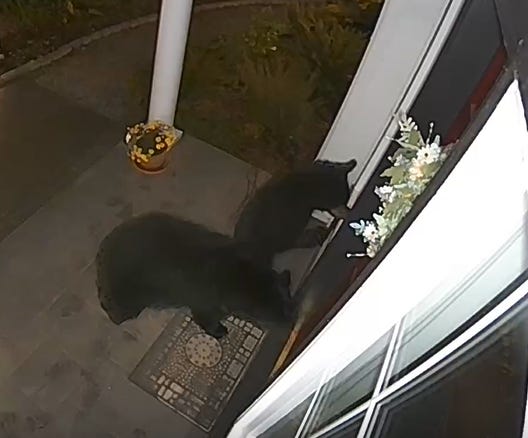Write That S**t Down. The Importance of Taking Notes.
In organizations, you will continually re-litigate decisions and agreements if you don't carefully document them.
Last night, our various Ring security cameras and trail cameras caught deer, raccoons, a cat, and two bear. The bear walked up to our front door, and peeked through the window. We're in the suburbs of Seattle, but it sometimes feels like we're in a national park.
Speaking of national parks. My wife and I just came back from a couple of weeks in the Northeast, visiting Maine/New Hampshire. Acadia and the White Mountains featured prominently in our hiking adventures. This also means I'll be sharing some recent photos.
A 40+ year old white man walked into the conference room. (Yes, this sounds like the beginning of an inappropriate joke.)
At a tech company, when you're expecting to meet with a few software engineers, an older white guy walking into the room frequently indicates extremely upper management. The fact you can make that assumption also suggests numerous things about tech companies.
But anyway, sure enough. As soon as everyone was seated, he spoke first, with a confident and slightly condescending tone, indicating that he was indeed senior to everyone in the room.
"I know you wanted to discuss the API integration plans between our teams, but I asked my team to stop the work. We need to first discuss the costs this will bring our organization, and how you will fund it."
We were taken aback. Just a few months ago, after multiple meetings, their organization had agreed to build some APIs for our organization. They'd agreed it was the right thing to do for customers, they should own the APIs, and we'd literally shaken hands on it. But we hadn't shaken hands with this guy.
"Sorry, perhaps I missed something." I said. "What's your role?"
He looked at me and frowned. "I'm Carlton, I own API discovery."
Ah, I vaguely knew that they had a new VP, and this must be him.
"Nice to meet you, Carlton." I said, although that wasn't true at all. In reality, I was deeply upset that he showed up with this bully attitude. But you need to say these kinds of things. "I'm Dave, and I manage the using the API team. I'm afraid that halting our progress has me concerned because we already have agreements with your team, and we have a tight schedule. We intended to finalize some API details in this meeting."
"I understand your team expected us to do the work." he said, "but I've heard no explanation of how this will be funded. Once you've clarified that, we can proceed."
I had to cancel the meeting because we were unprepared for that discussion. Which I'm sure was what Carlton wanted.
I looked through our email chains and our meeting notes from our prior meetings. My team remembered that funding was not brought up, but nothing had been written down. We were now behind schedule, and had a new VP to negotiate with.
First, this is not an uncommon scenario to deal with as a leader in a big company, particularly a company run like Amazon. It's one of the biggest things I don't miss when I think about my time as leader there.
But more importantly, what's the real problem here, beyond Carlton being a headstrong jerk?
We had minimally tacit agreement (if not verbal) for their team to do work without funding, and we'd built our schedule around that agreement. Without documenting that agreement, it vaporized over time.
What's the solution?
Write things down!
Post meeting notes.
Wikis.
Email chains.
Copy instant message discussions.
But why is this necessary if everyone's on board? It can feel odd to have a casual conversation, and then send an email afterward to "confirm" a decision, as if you're a lawyer.
Why agreements and decisions fade over time.
It's astonishing how often we run into this type of scenario. You have a discussion about a topic with a few people.
You discuss some decisions, and everything makes sense. Everyone's on the same page, and happy about it. "Sounds like we're all in agreement, great!" And everyone nods. It feels like you're done.
And then 3 months later, the topic comes up. And people have concerns. And they don't remember the prior agreement.
This happens for various reasons.
Bad Memory - Your co-workers are humans, working on 75 things, and they might just forget. This one 30-minute meeting could easily slip their mind.
Assumptions - You made assumptions, and those assumptions were different than theirs. Without explicitly writing down each assumption, you might both have different memories of what was agreed.
Excluded folk - You agreed with 4 important people. What about the 5th one who couldn't make the meeting? They don't remember, don't agree, and didn't take part in that conversation. From their perspective, no agreement was reached.
New folk - As per my example above, you agreed with the previous leader of the organization. A new leader comes in, and they legitimately didn't take part in the conversation. This can happen because of new hires, promotions, or org restructuring. Without documentation, they rightfully feel they need to figure out their answer to this situation.
Convenient memory - You always hope this isn't the case because it's rude. People later regret decisions. If it's not documented, you can conveniently forget the prior agreement, and re-negotiate. "I said I was going to do that? I don't remember saying that. I can't imagine I intended to agree to that. If that discussion happened, we must have had different assumptions in mind."
Considering the above, what types of situations and decisions might take place, and what types of things should we be documenting?






